At the end of the First World War, Henny Porten appeared as a tragic dancer in the drama Die blaue Laterne/The Blue Lantern (Rudolf Biebrach, 1918), based on the novel by Paul Lindau. The film was produced by the pioneering film company Messter-Film, for which Porten had appeared in films since 1906.
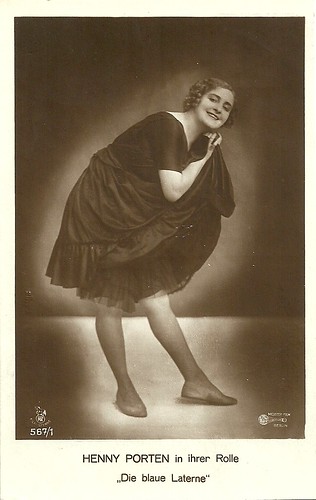
German postcard in the Film-Sterne Series by Rotophot, no. 567/1. Photo: Messter-Film, Berlin. Publicity still of Henny Porten in Die blaue Laterne/The Blue Lantern (Rudolf Biebrach, 1918).
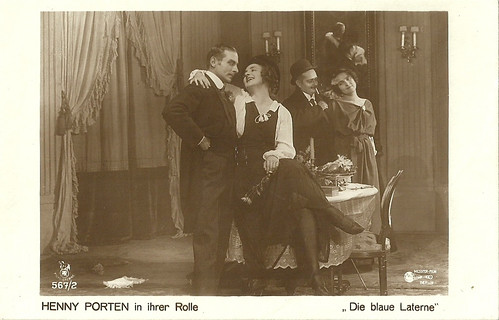
German postcard in the Film-Sterne Series by Rotophot, no. 567/2. Photo: Messter-Film, Berlin. Publicity still of Die blaue Laterne/The Blue Lantern (Rudolf Biebrach, 1918) with Henny Porten and Ferdinand van Alten.
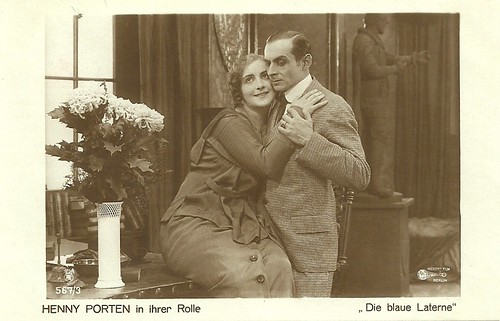
German postcard in the Film-Sterne Series by Rotophot, no. 567/3. Photo: Messter-Film, Berlin. Publicity still of Die blaue Laterne/The Blue Lantern (Rudolf Biebrach, 1918) with Henny Porten and Ferdinand van Alten.
Die blaue Laterne/The Blue Lantern (1918) was made by Rudolf Biebrach in the Messter film studio in Berlin's Blücherstraße 32. Sets were designed by Jack Winter, while Karl Freund did the cinematography and the later director Eric Charell choreograped the dance scenes. Irene Daland wrote the script.
Sabine Steinhardt (Henny Porten) and her sister Ellen (Johanna Zimmermann) are both dancers. They have lived a righteous life so far when a dramatic event shakes everything up: embassy councilor Von Guntershausen (Ferdinand von Alten) seduces Sabine and makes her his lover. Ellen marries a banker.
After a while, however, Von Guntershausen drops Sabine. Repulsed by Sabine's morally casual way of life, Ellen turns away from her sister. Then Sabine lands as a hostess in the shady nightclub Die blaue Laterne (The Blue Lantern).
One day she accidentally becomes the guardian angel of the child of Privy Councilor Kurt Franzius (Bruno Eichgrün) and saves the child from great danger. Out of love and gratitude, Kurt Franzius wants to marry Sabine. But when he learns from the seducer Guntershausen about Sabine's past life, he refrains from his intention. Desperately, Sabine, now completely isolated, wants to poison herself, but she dies unexpectedly from a heart attack.
Die blaue Laterne/The Blue Lantern (Rudolf Biebrach, 1918) was submitted for German censorship in November 1918, while the premiere in Berlin took place on 29 November 1918, at the Mozartsaal cinema. Paimann’s Filmlisten wrote: "Story, acting and direction are excellent. Photography very good. (A Hit)."
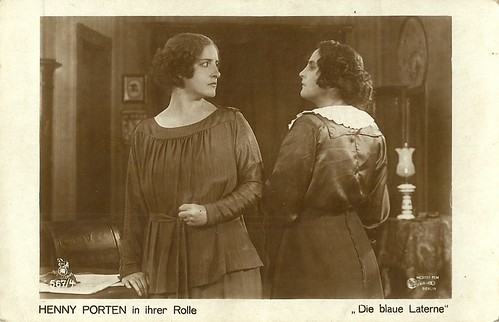
German postcard in the Film-Sterne Series by Rotophot, no. 567/4. Photo: Messter-Film, Berlin. Publicity still of Die blaue Laterne/The Blue Lantern (Rudolf Biebrach, 1918) with Henny Porten and Johanna Zimmermann.
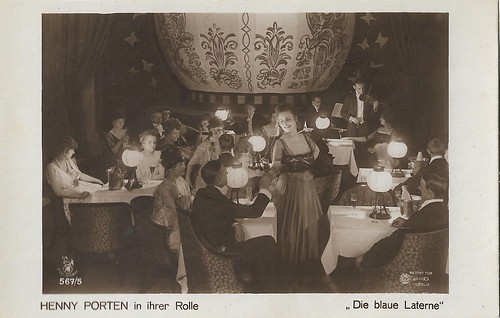
German postcard in the Film-Sterne Series by Rotophot, no. 567/5. Photo: Messter-Film, Berlin. Publicity still of Henny Porten in Die blaue Laterne/The Blue Lantern (Rudolf Biebrach, 1918). Porten is visible here in the inn The Blue Lantern.
Sources: Wikipedia (German) and IMDb.

German postcard in the Film-Sterne Series by Rotophot, no. 567/1. Photo: Messter-Film, Berlin. Publicity still of Henny Porten in Die blaue Laterne/The Blue Lantern (Rudolf Biebrach, 1918).

German postcard in the Film-Sterne Series by Rotophot, no. 567/2. Photo: Messter-Film, Berlin. Publicity still of Die blaue Laterne/The Blue Lantern (Rudolf Biebrach, 1918) with Henny Porten and Ferdinand van Alten.

German postcard in the Film-Sterne Series by Rotophot, no. 567/3. Photo: Messter-Film, Berlin. Publicity still of Die blaue Laterne/The Blue Lantern (Rudolf Biebrach, 1918) with Henny Porten and Ferdinand van Alten.
A hostess in a shady nightclub
Die blaue Laterne/The Blue Lantern (1918) was made by Rudolf Biebrach in the Messter film studio in Berlin's Blücherstraße 32. Sets were designed by Jack Winter, while Karl Freund did the cinematography and the later director Eric Charell choreograped the dance scenes. Irene Daland wrote the script.
Sabine Steinhardt (Henny Porten) and her sister Ellen (Johanna Zimmermann) are both dancers. They have lived a righteous life so far when a dramatic event shakes everything up: embassy councilor Von Guntershausen (Ferdinand von Alten) seduces Sabine and makes her his lover. Ellen marries a banker.
After a while, however, Von Guntershausen drops Sabine. Repulsed by Sabine's morally casual way of life, Ellen turns away from her sister. Then Sabine lands as a hostess in the shady nightclub Die blaue Laterne (The Blue Lantern).
One day she accidentally becomes the guardian angel of the child of Privy Councilor Kurt Franzius (Bruno Eichgrün) and saves the child from great danger. Out of love and gratitude, Kurt Franzius wants to marry Sabine. But when he learns from the seducer Guntershausen about Sabine's past life, he refrains from his intention. Desperately, Sabine, now completely isolated, wants to poison herself, but she dies unexpectedly from a heart attack.
Die blaue Laterne/The Blue Lantern (Rudolf Biebrach, 1918) was submitted for German censorship in November 1918, while the premiere in Berlin took place on 29 November 1918, at the Mozartsaal cinema. Paimann’s Filmlisten wrote: "Story, acting and direction are excellent. Photography very good. (A Hit)."

German postcard in the Film-Sterne Series by Rotophot, no. 567/4. Photo: Messter-Film, Berlin. Publicity still of Die blaue Laterne/The Blue Lantern (Rudolf Biebrach, 1918) with Henny Porten and Johanna Zimmermann.

German postcard in the Film-Sterne Series by Rotophot, no. 567/5. Photo: Messter-Film, Berlin. Publicity still of Henny Porten in Die blaue Laterne/The Blue Lantern (Rudolf Biebrach, 1918). Porten is visible here in the inn The Blue Lantern.
Sources: Wikipedia (German) and IMDb.
No comments:
Post a Comment